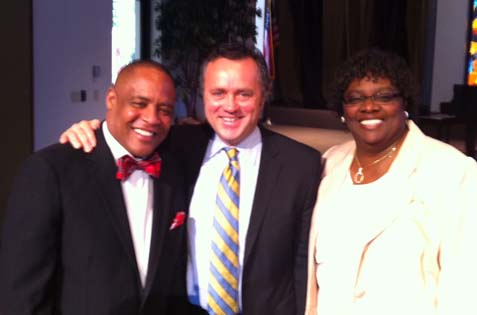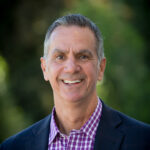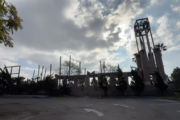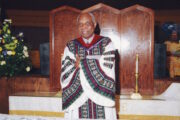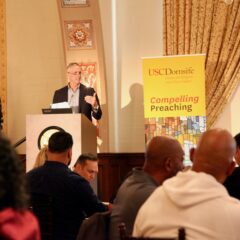I attended chapel today at Biola University (where I once worked), which increased the number of times I have attended a Biola chapel from zero to one. But, if chapels had been like today’s, maybe I would have been a regular. Well, at least I would have attended when the speaker was someone like Rev. Mark Whitlock, who preached today. Â Whitlock pastors Christ our Redeemer AME Church, which is the rare church that is both multi-ethnic and an African American church in both identity and history. He is also the executive director of the Cecil Murray Center for Community Engagement at the University of Southern California.
Now one could be a bit cynical and suggest that the only reason that Mark was speaking in chapel at Biola—a predominantly white, evangelical school with 100 year-old roots in Los Angeles—was because February is Black History Month. And although that was the point of contact for today’s chapel service, not only was his message welcomed with open hearts, but all in attendance were fully engaged and participating in the sermon. Whitlock preached today! Not only did he introduce many of the students to a Christian tradition they had never experienced before, he had all 400 or so people who were crammed into the chapel, clapping for Jesus, loudly responding to his prompts to participate, and in general, kept their attention throughout.
He also challenged these students to think more deeply about what their religious commitments actually mean, beyond their own personal spirituality. Rooting his message in the text from the Apostle Paul in which he suggests his work is not complete (Philippians 3:12-14), he told the students that the work of the Church will never be complete while there is prejudice and discrimination, while there are hungry and hurting people, and while there is still injustice in the world.
In my view, this message may be particularly timely, not only for Biola students (and perhaps staff and faculty who were also in attendance), but more broadly. There seems to be a shift taking place among younger evangelicals in that they are seeking more outlets to actually live out their faith in practical ways in their communities. A quick look at the Biola website shows that there have been several student groups who are reaching out to the less advantaged in southern California. On a much larger scale, the Dream Center, where we have been working on a project for the last couple of years, is attracting young people just like those in attendance at chapel this morning, in their efforts to, as they consistently frame it, “love on” those who are hungry, homeless, and are otherwise in search of a caring community.
In the end though, I am left with the question of whether these nascent impulses to serve others, and to overcome racism and separation from others will last throughout the lives of these young evangelicals. Only time will tell, but I believe that this is a much better starting point than what the old culture warriors of the religious right would have wanted— and probably much more Christian.
Photo: Mark Whitlock, Barry Corey (President of Biola), and Doretha O’Quinn (Vice Provost of Multi-Ethnic and Cross-Cultural Engagement)
Richard Flory is the executive director of the USC Center for Religion and Civic Culture.
